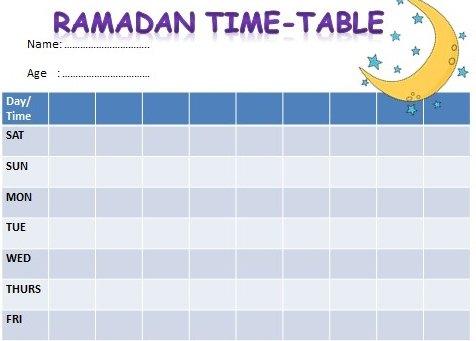ANY habit that becomes an inseparable token of our lives is never the result of a day’s work. Instead it is a consequence of endless time and targeted energy. An addictive pattern that we are currently adhering to, can be easily traced back to our toddler days or definitely to a long period of time in our past.
The practice could be as simple as hugging a comfy pillow while sleeping or drinking a sip of water after every bite or starting the day with the Quran. The list of habits may seem trivial and endless but surprisingly they become an intimate part of our survival. They are stored in our subconscious and often function involuntarily without much struggle, because they were instilled into us from a very early age.
A fruitful habit is the result of dedicatedly sowing values and concepts along with constant motivation and evaluation – very similar to a fruitful lush green tree. A tree with its deep roots, high, green shoots, strong trunk, firm fibres and shade that cools and relaxes a bystander and dense vegetation is definitely the outcome of a gardener sowing precise seeds, constant watering, weeding, fertilising and all that is necessary for cultivation. [Also read: Mothering The Ummah]
The same concept is applied to nurturing children. History proves that most Prophets were the product of the training and education brought by the Prophets before them, i.e. the prevailing divine and spiritual training provided by the past Prophets was quite influential for those coming after them.
The true spirit of Islam that we find in the Companions of Prophet Muhammad ﷺ and their children is the fruit of the upbringing that they received at the hands of their parents. The great scholars of Islamic history too were nurtured from a very young age by their parents. The Prophet Muhammad ﷺ said, “No father has given a greater gift to his children than good moral training.” [Tirmidhi]
Get an early start
If a parent truly wishes to see their child as a good practicing Muslim, the seeds of Eeman and Islam need to be sown into the heart right from childhood — it’s not a spontaneous or easy process. [Also read: How To Establish Islam In Your Homes]
It is illogical for a parent to expect their child to magically transform into a practicing Muslim during their adult-life when no efforts were taken at an early stage and later grieve and moan when the bubble of their fantasy bursts.
To reach the destination the journey must begin now. And with Ramadan just beginning, this could be a great opportunity for parents to commence their journey or another chance for parents who have already begun the process of instilling Islamic virtues in their children’s lives.
A strict regime, monotony, lectures and theory will fail to create a lasting impact and may lead the child to temporarily perform certain rituals without their heart and soul into it. Parents of this era must utilize creative ways to instil the value of Ramadan.
Here are some of them:
1. Get excited:
 Create an atmosphere of bliss and happiness at home. Kids catch on to their parents’ enthusiasm. Parents must express the excitement and passion within them, that they ‘can’t wait’ for Ramadan to begin. Children should feel the essence of Ramadan even before it has arrived and must eagerly wait to welcome the blessed month.
Create an atmosphere of bliss and happiness at home. Kids catch on to their parents’ enthusiasm. Parents must express the excitement and passion within them, that they ‘can’t wait’ for Ramadan to begin. Children should feel the essence of Ramadan even before it has arrived and must eagerly wait to welcome the blessed month.
Decorate homes with banners, balloons, posters and lights. Involve them in the decoration and educate them as they get their hands dirty. Distribute cards wishing everyone, tell them the great value of this blessed month and engage them in Ramadan nasheeds and duas.
2. Read about Ramadan together:
 Narrate stories of how the Companions of the Prophet ﷺ spent their Ramadan, the virtues of this great month and how every act gets multiplied manifold and that their bitterest enemy — Shaytan — is chained.
Narrate stories of how the Companions of the Prophet ﷺ spent their Ramadan, the virtues of this great month and how every act gets multiplied manifold and that their bitterest enemy — Shaytan — is chained.
With a little research over the net and a quick run to a library or bookstore, you can get innumerable resources and ideas to get the ball rolling. [Also read: Things Every Muslim Home Should Have]
3. Start a Ramadan calendar:
 A little creativeness can go a long way and one could either buy or make a similar calendar at home with imaginative ideas. Based on the children’s level of capability parents can fill the pockets with tasks to be done on a specified day like reciting the Quran, fasting, attending taraweeh, an act of Sunnah, something for the community.
A little creativeness can go a long way and one could either buy or make a similar calendar at home with imaginative ideas. Based on the children’s level of capability parents can fill the pockets with tasks to be done on a specified day like reciting the Quran, fasting, attending taraweeh, an act of Sunnah, something for the community.
Each completed task is rewarded with a little gift kept in the pocket.
4. Plan Ramadan goals as a family:
 Ramadan passes by in the blink of an eye, so it is important to plan ahead to utilize this month to the fullest. Sitting together and planning as a family involves the little children. Family members must motivate and remind one another of their goals as the month progresses.
Ramadan passes by in the blink of an eye, so it is important to plan ahead to utilize this month to the fullest. Sitting together and planning as a family involves the little children. Family members must motivate and remind one another of their goals as the month progresses.
The youngest members of the family can have a few targets to complete, such as memorizing three new Surahs, learning duas with meaning or praying all the five obligatory prayers on time and so on. The entire family can collectively agree on one bad habit to quit during Ramadan or could decide to follow a Sunnah.
All this can be sketched out on a chart and posted at a prominent spot in the house. Special prizes can be announced or kept as a surprise for the ones who accomplish their goals.
5. Encourage various acts of Sadaqah:
 This could be great opportunity to teach children the importance of charity and the satisfaction one attains by sharing with those who have less than they do.
This could be great opportunity to teach children the importance of charity and the satisfaction one attains by sharing with those who have less than they do.
This act is not linked with monetary help alone but can be as simple and sincere as sharing iftaar food. Let children get involved with cooking and chores to accomplish this task. They can perform simple tasks and distribute the prepared food by themselves.
6. Set a Ramadan time-table:

A practical time-table for the day will assist children to a great extent. The schedule must include slots like suhoor, nap, school, recitation, memorizing, play time etc.
In the end, children love to follow anything new and innovative.
7. Pray as a family:
Allocate at least one or two acts of worship where the entire family participates like the Tahajjud prayer in congregation, understanding the meaning of the Quran, reading a hadith in detail and so on. Children can maintain a journal on what they learnt everyday and be creative. [Also read: How To Raise And Discipline Boys]
8. Creative Eid preparations:
 Get the children to prepare Eid cards for their close family and friends. They can assist in preparing some dish to be distributed to the needy around the house or help in decorating the home.
Get the children to prepare Eid cards for their close family and friends. They can assist in preparing some dish to be distributed to the needy around the house or help in decorating the home.
Children must enjoy the blessings of the festival granted by Allah to us – take them out for prayer, dress them their best, give them gifts, party with them…let them feel the joy of ‘Eid.
9. Remind them of the purpose:
If children don’t see the reason behind the tasks they are doing, they won’t have the motivation to complete them. To avoid forcing the children to pray, fast and do other good deeds, make sure they understand the real purpose behind it.
Before starting any activity, whether it is story time or making charts, explain exactly why they are doing this activity. Remind them that they are doing acts of worship to please Allah and not for anything else.
Clarify to them when gifts from parents could make them this happy, then the rewards they will receive from Allah will take their happiness to greater heights.
Their aim must be to receive the better and bigger rewards of the Hereafter.
10. Seek help from Allah:
A person asked the Prophet ﷺ : “Should I tie my camel and have Tawakkul (trust in Allah for her protection) or should I leave her untied and have Tawakkul?” The Prophet ﷺ replied: “Tie her and have Tawakkul.” [Tirmidhi]
With this thought, every parent must try their best to nurture their children but at the same time seek the help of Allah. Efforts should be undertaken but the outcome of the efforts lies solely in the hands of Allah.
May Allah make our children the coolness of our eyes and a great blessing in this world and the Hereafter. Ameen!






 Dr. Bilal Philips
Dr. Bilal Philips